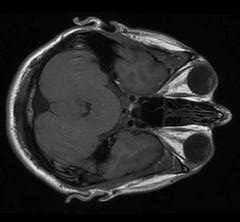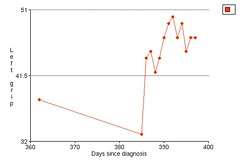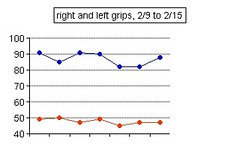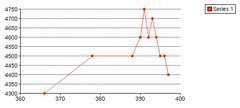D+7: Valentines Date
Today's left grip is 47 (47, 45, 47), right grip is 88 (88, 82, 85).
I have also included a chart comparing the right and left grip strength over the period from 2/9 to 2/15, inclusive. What I find interesting is that on five of the six days after 2/9, the left and right grip strengths moved in opposite directions, (if we consider a result that stays the same while the other moves in either direction to be "opposite").
Inhale volume is down to 4400 mL, but I have a raw throat and my lovely wife has a sore throat, so I may be fighting off something. Here's a chart of inhale volume covering roughly the same period as the grip strength charts. It starts on 1/14/05 rather than 1/10/05.
So my lovely wife and I went to the checkup at the ALS clinic yesterday, and these are my notes. Sometimes people find my blog entertaining, and I am gratified by that, but I do still use it to keep track of the tons of information I gather. This entry is just such a grab-bag, and I'm sorry if it bores you.
The thing they watch most closely is your Forced Vital Capacity, or spirometry, which is a measure of breathing capacity. My score yesterday was 92 percent of what would be expected for someone just like me who did not have ALS.
When I was diagnosed on 1/28/04, it was 94 percent. Then on 4/5/04, it was 97.3 percent. So I am doing OK in that area, as they don't start to worry until you hit 86 percent or so. At least I think that was the number, I have sent an email to verify. They also said you could have a 6 percent variation and they wouldn't worry. I think that may be the speech they give to people who get low scores.
I talked to them about the riluzole and my bilirubin, and they said that's no reason to stop taking it. They also said it's not a burden on the liver. I asked to hear about the exciting data from people in Ireland and Britain taking riluzole, and whether they are showing better trends, and I was told that nothing has been published, and it's all informal. My own personal bias is that this response proves that riluzole is worthless.
Riluzole requires a blood test for liver function every month for a while when you first go on it, and then every three months during the first year. I spent a year taking that drug without getting my liver function tested at all. Yesterday they gave me a prescription for a blood test for liver function, bilirubin, and cholesterol.
In a fun twist for you science fans, the doctor also decided to have me take a blood test for "very long chain fatty acids," which she says is a definitive test for whether you have an X-linked, rare, hereditary condition that can mimic ALS, called adreno-myeloneuropathy. She said it's a real long shot. But, she said, the syndrome comes with a long life expectancy. I didn't readily find a good definition of it on the web. And the Merck Manual we have says that it mostly strikes adolescent boys. They go spastic and blind. No cure is known. My vision in kindergarten was measured at twice as acute as most people, and when I was in my mid-30s it was tested at 20-20. So I may be going blind. I've been told that I look like a kid, but let's face it, I'm a 42-year-old dad, not a boy. But since the blood test is definitive, I'm willing to try it, if it means I don't have ALS. This raises the topic of Malady Poker as a follow-on to yesterday's Amputation Derby, so ponder that on your own time, because in this post I have to finish making my notes.
The factors she said made her think I might have adreno-myeloneuropathy are:
- you are a skinny little bastid, aren't you?
- high cholesterol ("lipid disorder")
- the tingling and numbness I reported at diagnosis time
- visible demylenation in my MRI
She also twiddled my big toes on both feet and asked me if she had moved it up or down. I believe that I called each of those correctly. After we got home, I asked my lovely wife if she saw any trickery, and she said she saw none.
It turns out that the Mitsumoto book is technical in the first edition, but the second edition, the one we got, is all geared towards patients coping.
I asked the doctor how long I might be able to stay out of a wheelchair, given my trajectory so far. She said the predictive information she has is geared towards survival, but not ambulation. Somehow or other, I did not ask her to predict my survival.
I asked them about whether they'd be involved in Rothstein's upcoming gene trial, and they said no. When I asked them to try to become involved, so that I could participate, they said it was unlikely.
Apparently they will be doing a ceftriaxone trial, and more details should be available by April.
They had this really cool, giant poster on the wall about a patient-driven, horizontal registry for collecting information about people with ALS. But it had no URL on it. We asked practically every person who talked with us if they knew the URL. None did.
They gave me a prescription to find a physical therapist who will show me some stretches. I was told to ask for neck and head exercises to help with the disarthria (difficulty speaking). I was told to ask for someone experienced in rehabilitation with neuromuscular problems, and not just accept any old P.T.
They also gave me some stretches to do, and pitched yoga really hard.
They said that rather than take 1000 I.U of vitamin E twice daily, I should take 400 I.U. only once daily. Apparently there is some research showing possible problems with taking so much E.
The dietitian likes my diet, says it is very healthy (I can't help it, these are the foods that appeal to me). But she said I should eat more, take in more calories. She suggested soy milk, and fruit juices, and bigger portions. Plus plenty of animal protein. Yeah, you know what I'm takin' 'bout. Dead chickens! Also, dis the chickens some more by adding eggs whites to my daily egg, which gives you protein. There is the karmic hit, though, of pouring that egg yolk down the drain. Yeah, I know, I could mail it to a place where they need it, but I fear the response from Pyongyang.
The speech therapist said that my sense of a sudden progression in speech problems in the last few months is not what I think it was. She said that in her experience, the muscles involved with speech decay at a constant rate, and when they cross a threshold where the problem becomes noticeable, people think that it just suddenly happened. The analogy she made was to water boiling. The temperature gradient is constant, but if we were just observing with our eyes, when we saw the bubbles, we might think it was a sudden change. It feels like our speech is in a plateau that suddenly changes, she said, but the deterioration is constant. My speech rate is 189, and on 1/28/04 it was 198. She said I'm holding up very well as far as speech goes, and that I'm 100-percent intelligible. She also said there are no exercises you can do to strengthen the speech muscles; you just stress them when you try to do that.
We also talked with someone about Social Security Disability benefits. Check that form they mail you every year that has your earning history on it, it might tell you what your benefit would be. There is some maximum. When you sign up for Medicare, opt for part A and part B, which costs $77 per month. Medicare can cover medical costs but not prescription drugs. COBRA seems to mean that you can continue your health insurance for 18 months after your employment ends, if you pay the full premium, before they dump you, and it seems to mean that you are by law allowed to shift onto some other luckless insurer, but they can raise the premium a huge amount, like 150 percent.
Again, welcome to America, where the system works perfectly ... if you're rich.
The people from The MDA and ALSA were great, as usual.
We also talked to the doctor about the disinhibition (which they call "lability") that makes me laugh when I'd prefer to be serious (e.g., when giving a stern lecture to a five-year-old). They gave me four weeks worth of free samples of a drug they said is very good at controlling that problem, and said that I should begin seeing results in two or three weeks. It's called Lexipro. It's an antidepressant related to Zoloft. I don't have any mood problems (other than being terminally content), but this one has a "very selective" effect, the doctor said. I'm personally very leery about antidepressants, because I'd prefer to be who I am. Yes, even if I were depressed. Oh yeah, the doctor said it also has one other possible side effect: delayed ejaculation.
It was Valentines Day.
I may try it. And I'm very curious to see if it works.





<< Home